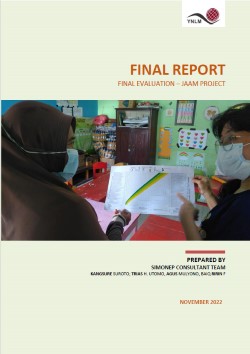Final Evaluation – JAAM Project
About the publication
- Published: November 2022
- Series: --
- Type: --
- Carried out by: SIMONEP Consultant Team
- Commissioned by: --
- Country: Indonesia
- Theme: Civil society
- Pages: 29
- Serial number: --
- ISBN: --
- ISSN: --
- Organization: Digni/Norsk Luthersk Misjonssamband (NLM)
- Local partner: YNLM
- Project number: QZA-18/0159-302-303

Background:
YNLM started a community development project on Lombok in 2018. The target area experienced severe earthquakes the same year, which forced the project to carry out emergency response that delayed the implementation of regular activities for 1 ½ years. The project was implemented in 4 villages on North Lombok with the goal to improve growth and wellbeing among children under 3 years. Main objectives were “Children under 3 years has a sustained nutritional diet” and “Children’s physical, social/emotional and intellectual development is according to age”.
Purpose/objective:
The evaluation should contribute to learning for rightsholders, local partners, YNLM and backdonor. Further, the evaluation should provide an objective and systematic assessment of the project's achieved results, and document that funds are used in accordance with applicable agreements and guidelines.
Methodology:
The methodology of the evaluation employed a mix of qualitative and quantitative approaches. Data was collected through household survey, focus groups discussions, key informant interviews, document review and observation.
Key findings:
The survey results showed that the target villages were better off than the control villages when it comes to exclusive breastfeeding, diversity of food, utilization of the yard, and parenting patterns. 20 out of 23 indicators were achieved, hence the project was categorized as “very effective”. The challenges are related to the consistency of people in applying the results of training and mentoring, that the village program support tended to be more in forms of infrastructure and incentives, and to the synergy with similar programs from the North Lombok Regency Regional Apparatus Organization. The impact level of the project in the context of improving nutrition and growth and development was still at the level of encouraging changes in community behaviour. The nutrition garden area was at the level leading to the application of results. The challenge was the lack of discipline of the assisted community in carrying out the recommended health institution operations without intensive assistance from champion cadres. Other challenges were related to technical matters, starting with how to plant, caring for plants and lack of seed availability. The potential for sustainability of the Nutrition Education and Rehabilitation Sessions, nutrition and growth gardens is quite large if it is encouraged through the Integrated Health Post and National Family Planning Coordinating Board.
Recommendations:
Further efforts to improve public health status need to be carried out more holistically, considering the influence by numerous specific factors. Poverty also affects the degree of children's health, so programs should be designed comprehensively and proportionally between socio-economic improvements to meet the nutritional needs of children and families. NGOs should ensure program synergy with various stakeholders so that program interventions are more effective and avoid overlapping activities. The roles of local village institutions and existing cadres should be revitalized and synergized to support maternal and child health improvement, especially nutrition. Collaborations should be built with universities, NGOs and research institutes to conduct thematic action research according to the needs and situations of the target community. Project knowledge management, which includes documentation and use of data/experience as learning media needs more attention. The advocacy function should be ensured since the project preparation period to build synergy with stakeholders. The good practices of the JAAM project and similar projects carried out by third parties, need to be well documented by the government (village, district) so that they can be a source of learning in encouraging the birth of public service innovations at the village and district government levels. Champion cadres should be actively involved in efforts to increase the capacity of other posyandu cadres so that the acceleration of behaviour change, and public health status improvement can be realized more quickly. Specific activities aimed for men's groups need to be designed to provide reinforcement for behavioural change related to gender relations.
Comments from Digni/NLM:
Due to large challenges related to severe earthquakes, high staff turnover, and the pandemic, the project prospects for impact are promising, yet uncertain. There is potential for further positive development, but new behavior and attitudes need more time to be considered sustainable. The evaluation assessed cost-effectiveness by separating indirect and direct project costs. We do not find this useful in capacity building projects in which the largest cost are often local salaries. The recommendations will be followed up in the continuation of the project plans.
